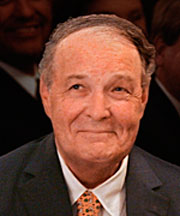July 28, 2014
Two of THI’s world-class researchers recently garnered outside recognition with awards for their innovation and dedication. A third has received a grant as part of an international team seeking to unlock one of cardiovascular disease’s perplexing genetic mysteries.
First,
Dr. Scott A. LeMaire was one of six announced earlier this month by Baylor College of Medicine (BCM) as winners of its 2014 Michael E. DeBakey, MD, Excellence in Research Awards. These awards are given annually to BCM faculty members who have made the most significant published scientific contributions in biomedical research during the past three years.
Also, Dr. Ali J. Marian is one of the winners of the Fondation Leducq’s 2013 Transatlantic Networks of Excellence Awards. Fondation Leducq is a Paris based institution dedicated to improving health through international cardiovascular research.
In addition,
Dr. James F. Martin is part of an international network of researchers who have received a grant from the Fondation Leducq. It includes colleagues from the United Kingdom, the Netherlands, Boston and Chicago who will all work on unraveling the complex genetic codes behind atrial fibrillation (AFIB), a heart rhythm disorder that affects over 3 million people in the US and 4.5 million individuals in Europe.
Dr. LeMaire, a surgeon-scientist, is also a professor of surgery and of molecular physiology and biophysics at BCM, and serves as Vice Chair for Research in the Michael E. DeBakey Department of Surgery and Director of Research in its Division of Cardiothoracic Surgery.
LeMaire’s clinical interest is the management of patients with thoracic aortic disease and his research interests include organ protection during aortic surgery, genetics aspects of thoracic aortic disease and molecular mechanisms of aortic degeneration.BCM said of him: “He is a surgeon-scientist whose contributions reflect his integrative approach to studying aortic aneurysms and dissections.”
Indeed a
New York Times article last December described Dr. LeMaire’s work as part of a team looking at a possible new blood marker -- a protein fragment in the blood -- to identify patients who have dangerous aortic aneurysms or dissections.
Dr. Marian is a THI scientist and professor at The University of Texas Health Science Center in Houston whose scientific interests include genetics and cardiomyopathy, a disease of the heart muscle.Last year, THI announced a
clinical trial under Dr. Marian’s direction to test the use of a drug commonly used to treat cystic fibrosis patients as a possible new way to prevent and reverse hypertrophic cardiomyopathy (HCM), the most common genetic heart disease, and a common cause of sudden cardiac death (SCD) in young people, especially young athletes.
Similarly, he is recognized by the Fondation Leducq award for his work on the “Molecular Genetics, Pathogenesis and Protein-Replacement Therapy in Arrhythmogenic Cardiomyopathy.”
That is, work to understand and intervene in the molecular genetic sources of this form of heart muscle disease that is a leading cause of sudden cardiac death in young people. As the Fondation reports, “The synergistic interactions between clinicians and scientists in this network [of international researchers] will ultimately improve the quality of life and survival of AC patients.” (I am, by the way, a member of the external advisory board for this trans-Atlantic research network.)
Finally, physician-scientist Dr. Jim Martin is director of THI’s Cardiomyocyte Renewal Laboratory, and Vivian L. Smith Professor at Baylor College of Medicine. His major areas of research include atrial fibrillation (genetic basis), heart development (and associated congenital heart defects), and heart muscle regeneration after heart attack.
He is part of an international network being funded by Fondation Leducq with a $6 million grant over five years to decipher the genomics behind atrial fibrillation (AFIB). Dr. Martin’s lab team will focus on a gene Pitx2, which regulates the asymmetrical development of the heart and other organs. They will look at how genetic mutations affect the electrical rhythm of the heart and will help to fill gaps in understanding of the molecular pathways underlying the arrhythmia. This work should ultimately provide new diagnostic tools and therapeutic strategies to reduce the unacceptable burden of stroke, death, and hospitalizations associated with this common arrhythmia.
“AFIB is a too common problem all over the world, and having a global team assembled to get at its most basic roots in our genes is an exciting proposition for which we have high hopes,” says Dr. Martin.
Yes, indeed. In fact, these three examples of the work under way in our labs and in the minds of our talented and dedicated physicians and scientists is a never ending source of excitement and high hope in the battle against cardiovascular disease. I am proud to see such work – and such researchers -- recognized.
With my gratitude and respect,

James T. Willerson, MD
President
P.S. The generosity in your hearts has changed the lives of others. THI can continue as a world leader in life-saving medical research and advanced treatments with your support.
Your heart, our minds, together change lives. Here we share some of our stories.
Contact Dr. Willerson.



